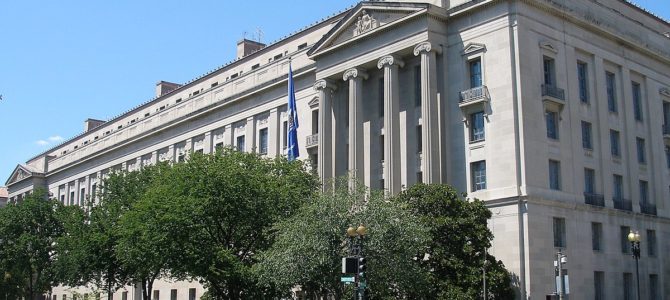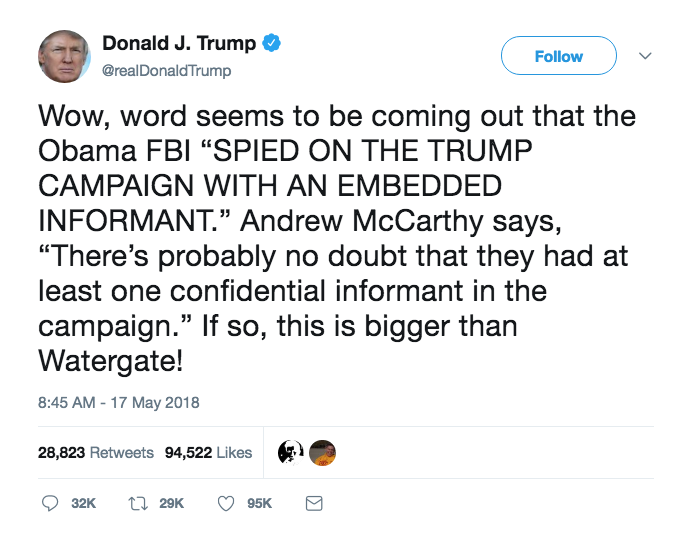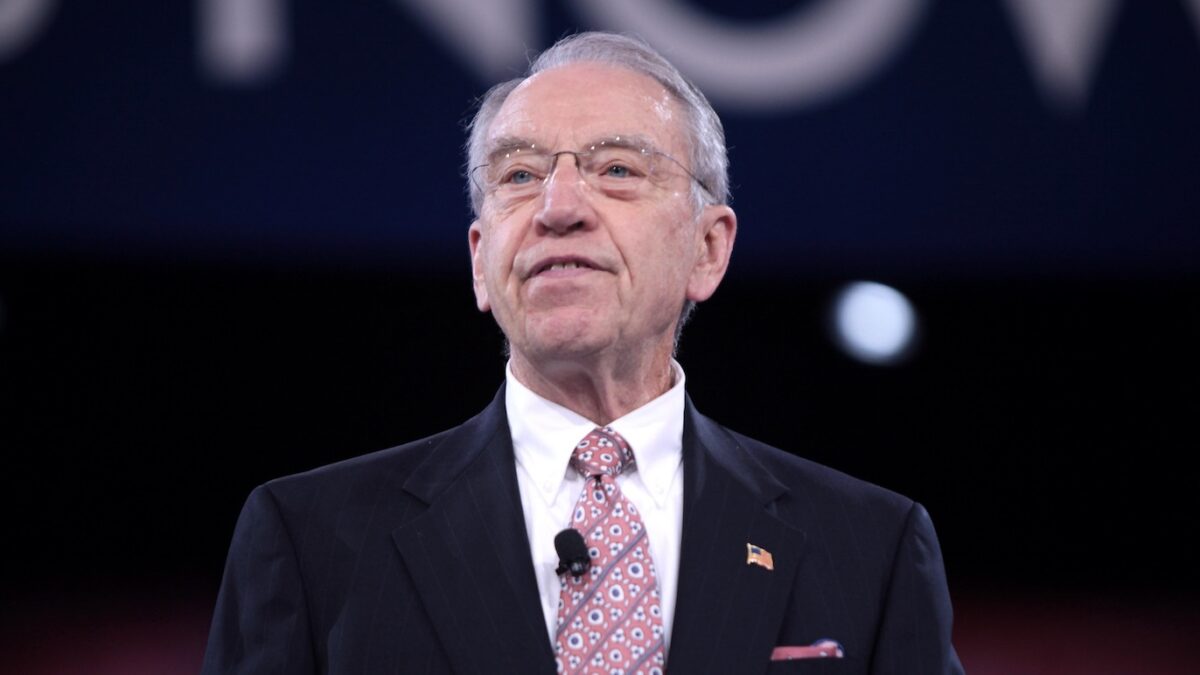
U.S. law enforcement and intelligence officials have leaked extremely sensitive information about a top secret source three times in the last week while claiming that confidentially sharing information about the source with congressional investigators could greatly impact U.S. national security and potentially risk the source’s life.
The officials have leaked specific information that could directly identify the source on three separate occasions to reporters at the Washington Post and New York Times. This raises even more questions about whether current top intelligence and law enforcement officials can be trusted to obey the law and to adequately protect the nation’s intelligence secrets.
The latest leak came via a Washington Post article in which the very same officials blame Congress for the leaks solely because a U.S. congressional committee subpoenaed the Justice Department for information about irregularities with methods used in the unprecedented investigation targeting the campaign of Donald Trump for president.
Before the leaks occurred, Deputy Attorney General Rod Rosenstein said, of the demand for information by Congress as part of its oversight duties, that the Justice Department would not be “extorted.” Then the leaks began spilling out.
Prior to the Washington Post‘s May 8 article “Secret intelligence source who aided Mueller probe is at center of latest clash between Nunes and Justice Dept,” it was unknown what the information sought by Congress dealt with. The story first put forth the narrative that responding to congressional oversight requests would “endanger a top-secret intelligence source” and “could risk lives by potentially exposing the source.”
The Justice Department has a pattern of claiming extreme danger if the American public or her representatives in Congress learn about what they are doing. For instance, as the House Permanent Select Committee on Intelligence prepared to release information about abuse of the secret courts that permit the government to spy on American citizens, the Justice Department released a letter to the press saying the action was “extraordinarily reckless,”would be “damaging” to “national security,” and would risk “damage to our intelligence community or the important work it does in safeguarding the American people.”
Justice and the FBI also have a pattern of redacting huge swaths of reports and letters to and from Congress as part of their oversight investigation. When the redactions are lessened, they reveal not sensitive information that affects national security so much as embarrassing details about how Justice and FBI have conducted business. Examples here and here.
The May 8 article, the one that claimed Congress couldn’t be given any information related to its subpoena, published leaks from government officials that the U.S government had a secret source who had helped the special counsel’s Russia investigation. The article said the source was a U.S. citizen who had worked with the CIA and the FBI.
In a May 16 article in The New York Times, government officials leak more information about the use of informants to spy on the Trump campaign. These leakers said there was at least one informant who was spying on the Trump campaign. They revealed that the informant met with multiple Trump campaign affiliates, including Carter Page and George Papadopolous.
In the most recent article published last night, the Washington Post‘s sources reiterate their claim that talking about the source is extremely dangerous, saying “leaders warn that publicly identifying the confidential source would put lives in danger and imperil other operations. The stakes are so high that the FBI has been working over the past two weeks to mitigate the potential damage if the source’s identity is revealed, according to several people familiar with the matter.”
But then they leak yet more information about the source, saying the source has worked on multiple investigations, some of which are “live” and ongoing. They also say the informant provided information to the Russia investigation both before the special counsel’s appointment in May 2017 and afterward.
All public information about the source and his or her work on behalf of the government has come directly from leaks attributed to government law enforcement and intelligence officials. This means they have provided more information to reporters at New York Times and Washington Post than they have in response to a congressional subpoena.
Here’s how Philip Rucker, Robert Costa, Carol D. Leonnig, and Josh Dawsey opened their latest Post story about people up to and including President Trump reading and responding to Washington Post and New York Times reports that a government source spied on the Trump campaign:
President Trump’s allies are waging an increasingly aggressive campaign to undercut the Russia investigation by exposing the role of a top-secret FBI source. The effort reached new heights Thursday as Trump alleged that an informant had improperly spied on his 2016 campaign and predicted that the ensuing scandal would be ‘bigger than Watergate!’
It’s not Trump who is alleging this! It’s the Washington Post! It’s The New York Times! It’s the government sources leaking about the use of wiretaps, national security letters, and at least one government informant against the Trump campaign. The editorialized addition of the word “improperly” is curious, as if the dispute is about whether the spying the FBI is now admitting it performed against the Trump campaign might have been “proper” if looked at from a just-so perspective.
The Washington Post had previously claimed that Trump backed Justice Department obstruction of the subpoena, which The Federalist showed was false here. The Post now reports, contra its own reporting last week, that Trump sides with Republican chairman of the House Intelligence Committee in his oversight battles with the Department of Justice.
When the Post first broke the news that the FBI had a government source it had used in its investigation against Trump, this was treated by reporters Robert Costa, Carol D. Leonnig, Devlin Barrett, and Shane Harris as something only conservatives might cynically be interested in for bad reasons, as opposed to generally explosive information of interest to all Americans. This is not an exaggeration.
They wrote, “The role of the intelligence source in the Mueller investigation may now be seized upon by conservative Republicans who have publicly accused the Justice Department and intelligence agencies of overreach and misuse of their surveillance powers.” This formulation of “conservative pounce” is so cliched it has an entry in Urban Dictionary as an example of leftist media bias:
A headline in a newspaper or other article that describes Republicans (or other right-leaning individuals) attacking a Democrat (or other left-leaning individual) when that Democrat commits a misdeed. Always written by a reporter with left-wing political views, it will attempt to frame the Republicans as overzealous, and will either downplay, ignore, or excuse the Democrat’s misdeed. Commonly done by the New York Times or Washington Post, it is often viewed as a sign of the bias within the media.
The Washington Post‘s headline for the most recent article is unsupported by the facts. It says “Trump joins push by allies to expose role of an FBI source.” Except that the reporting in the piece in no way supports this claim on multiple levels. For one, Congress is not seeking to “expose” the source by performing oversight. The committee that is seeking the information routinely handles classified information and is authorized to do so.
For another, nowhere has Trump called for the FBI source to be exposed. He simply tweeted facts that are known from the Washington Post‘s own reporting. Here he specifically mentions what another reader of the news — former chief assistant U.S. attorney Andrew McCarthy — has said about the public information reported in the Washington Post and New York Times:

The only exposure of the source at this point has happened due to leaks by government sources in the Washington Post and New York Times about the use of a government informant to spy on the Trump campaign.
It’s odd for the Post to spin the reading of their newspaper as nefarious or dangerous to national security, even if their leakers are telling them to use that angle about this latest extraordinary news — news that compliant reporters are covering up and downplaying more than covering rigorously, admittedly, but explosive news nonetheless.









